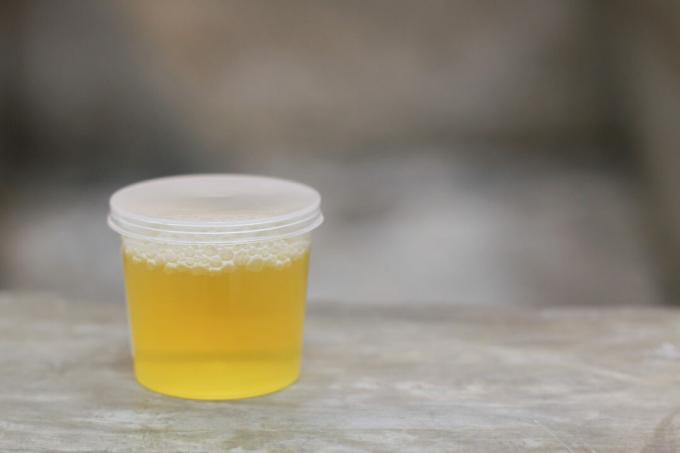Is human urea suitable for fertilizing plants? Find out here what speaks for and against fertilizing with urine.

Four things are essential for a plant to grow: light, water, CO2 and nutrients. The main nutrients include nitrogen, phosphate and potassium. These nutritional elements are usually made available to the plants in the field in the form of artificial fertilizers. Isn't that also possible more naturally? In this article we are looking into the question of whether our urine is suitable as a fertilizer.
contents
- Can human urine be used as fertilizer?
- Dangers of manuring with human urine
- Urine as a fertilizer: potential for the future
- Alternative to urine as a fertilizer
For artificial fertilizers you need huge amounts of energy so that, for example, nitrogen from the air is converted into a form that can be used by plants. For this reason, the use of mineral artificial fertilizers is not exactly good for the environment. The thought of simply supplying our plants with human urine does not, of course, sound particularly appetizing. However, the question is not absurd, after all, we fertilize our plants with the remains of birds and cows (guano and liquid manure). Then why not also with our urine?
Can human urine be used as fertilizer?
The human urine has a central task in our body - the elimination of metabolic waste products. Above all, the breakdown products of proteins get out of our body in the form of urea in the urine. Urea consists of almost 50% nitrogen and is therefore an extremely concentrated nitrogen fertilizer. Even our artificial fertilizers today cannot keep up.

To illustrate the amount of nitrogen, here is an example: An adult person produces 20 g of urea per day. With this amount more than 3 kg of tomatoes could be produced. Applied to the entire German population and calculated over the whole year, that would be 9 million tons of tomatoes! In addition to the very high nitrogen content, human urine also contains a lot of phosphate, potassium and calcium. If we only judge human urine based on the nutrients relevant to plants, diluted it would be a perfect fertilizer.
Dangers of manuring with human urine
Unfortunately, it is not that easy to fertilize with our urine. Because its use harbors many dangers - on the one hand for the fertilized plant, but also for us. First of all, there is a very banal problem: as soon as the urine has left our bladder, millions upon millions of bacteria attack it. This releases ammonia and creates the pungent, unappetizing urine odor. The assumption that human urine is germ-free is also incorrect. If you fertilize with urine, bacteria always get to the fertilized plants. However, we cannot say with certainty whether these bacteria are dangerous.
With the urine, drug residues and other unsightly substances can of course also get into the soil of the fertilized plant. This can also include table salt, because depending on how we eat, the urine can also contain a not inconsiderable amount of salt. As we know, most plants do not like salt at all and are quick to bless the temporal in the event of an overdose. Another important point is the pH of urine. Most plants prefer a pH between 5.5 and 7.0. In our urine, however, the pH value can fluctuate widely between 4.6 and 7.5 (daily). The pH of 4.6 may appeal to bog plants like that rhododendron, but most other plants will not be able to cope with this pH permanently.

Urine as a fertilizer: potential for the future
In summary, it can be said that our urine is not necessarily suitable for permanently fertilizing plants. But neither should the image emerge that every garden plant dies immediately as soon as someone has relieved himself of it. We see great potential in human urine in the future if the nutrient-rich fertilizer is prepared before it is used. Germs could be killed and unwanted substances such as table salt can be removed relatively easily. Research is already being carried out on urine treatment systems so that human urine can be used as valuable fertilizer on a large scale. This could reduce the use of artificial fertilizers, which would mean that the environment would be greatly protected overall.
Alternative to urine as a fertilizer
As we currently cannot recommend using your own urine as fertilizer in the garden, we offer an alternative below. Our Plantura organic fertilizer from mainly organic raw materials, provide your plants with long-term and natural nutrients. They are therefore perfect for gardeners with an awareness of sustainability.
